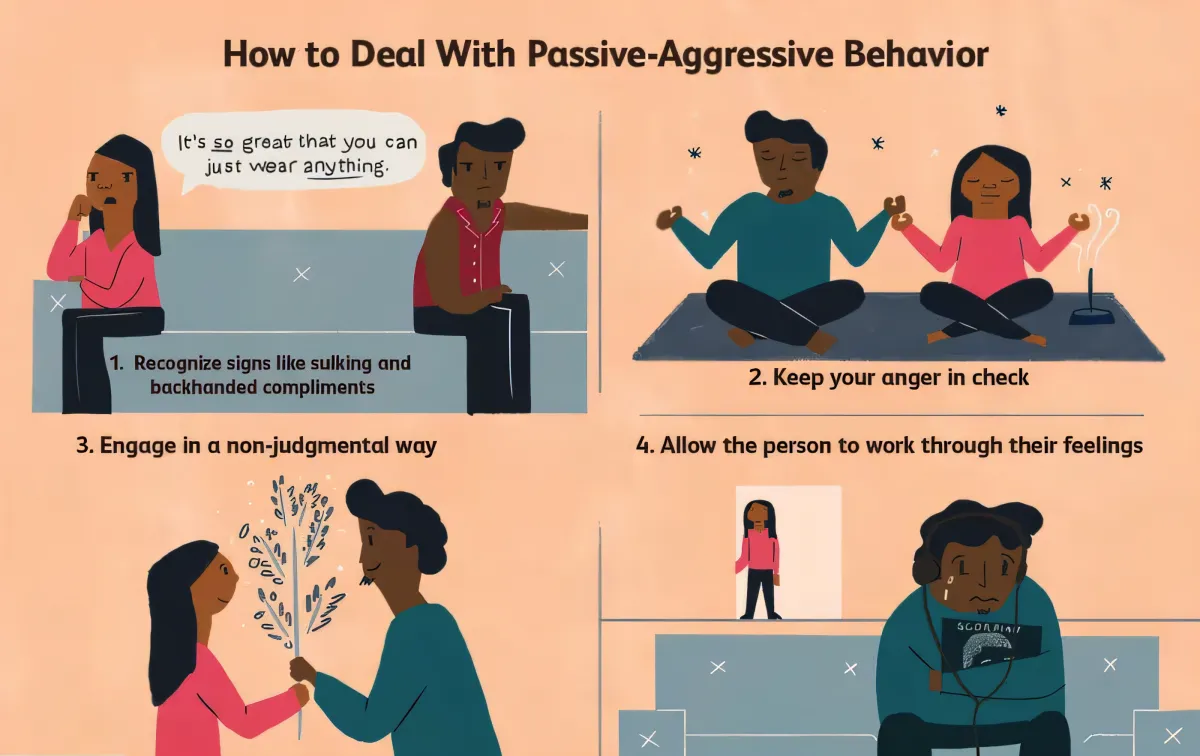What I Learned From Being Passive Aggressive
If this title got your attention, my guess is that you’re either passive-aggressive; introverted; both; or just interested. For all parties that have gathered, let me add the disclaimer that being an introvert is a personality trait and therefore reflects features of your personality.
However, being passive-aggressive is a behavior that can be demonstrated by any personality type. Introversion does not equal passive aggression. The two are mutually exclusive. Capisce? Capisce! Moving along.
If you’re an introvert, odds are you’re to yourself, don’t care to be in the spotlight, very observant, and breathe a great sigh of relief when plans get canceled. Sure, I just described myself, but if you checked those boxes too then hello fellow introvert!
With the common characteristics of this personality type being reticent and dare I say skeptical (sometimes) of the company of others, it is no wonder that confrontation repels the average introvert. Confrontation can be heated and intense, but other times it can be as simple as approaching someone regarding a minor issue (or vice versa).
Concisely put, confrontation can also be voicing your concerns where otherwise you would’ve been quiet.
Allow me to share with you all what being passive-aggressive has taught me.
1. People will misconstrue your silence as a license to push you around
Often times, silence is translated into a sign of weakness. It is assumed that because there is no blatant opposition to the matter at hand, you’ve forfeited all power to assert yourself. This moment becomes the reference point for future encounters. It starts as just one instance of compliance, then soon graduates into an endless “yes man” cycle. Though you’re reluctant, you find it hard to disagree now that you’ve set this trend of going along with it. And just like that, you find yourself being treated like a doormat.
2. Words will be put in your mouth
Silence leaves room for too many interpretations—many of which are not your own. Following this misconception is a string of many others that stem from the original. Along with pushing you around, people will nominate themselves as your honorary spokesperson. On those (rare) occasions when you want to speak up, you find that you’ve already been spoken for. The worst part is, the view or opinion doesn’t even fall in accordance with your actual views or opinions! It’s infuriating!
Here’s a positive...
3. You become even more observant
Just because you’ve become the person that never speaks up, doesn’t mean your other abilities aren’t working. I found that my observation skills sharpened from staying quiet. While everyone else fought to be the loudest in the room, I was able to detect traits and qualities that were detrimental to many characters. You learn to avoid a certain type of person a lot easier when you can read them. Conversely, you learn to befriend those that are imperative to character development. These are good people you can learn from.
And lastly,
4. Your conscience will nag you.
This is the worst one. In fact, this is the one that drives me to speak up if I’ve received a wrong food order, a wrong service, or I’ve simply been cut in line. (Ok, still working on the last one.) I can admit, I’ve reluctantly taken a wrong food item and scolded myself for hours on end. The voice in your head is louder and more condemning than any outside voice could ever be. After all, you are your own worst critic, right?
This is the internal equivalent of blatantly disregarding a parent that told you to complete some household chores. Now the garage of that same parent is opening menacingly, the car engine is getting progressively louder, and all you’ve done all day was watch TV.
The voice in my head though is none of those things. It is the collective sound of the paced footsteps towards the door and the insertion of the key into the lock. I just can’t bear to relive this daunting scenario every time I shy away from conflict. So you see, I’ve learned to speak up over time. It’s not perfect, but it’s better than where I was.
It’s hard to separate passive aggression from introversion, especially when the two are practically married. When trying to adjust to fit a new form of approach, it can feel as though you are completely altering your personality.
The good news though, time and experience will carve out your voice. I’ve spoken to a few older people, and they’ve all had similar experiences with being passive in their youth.

I’ve learned enough about myself to know that I no longer want to deal with the byproduct of being passive-aggressive. If you share the same sentiments, then it’s time to initiate the change. Start with something small and stay consistent. If you ever feel uncomfortable with these changes, you’re doing it right. It’s time to push out of that comfort zone.
Opinions and Perspectives
Great insights about how silence can be misinterpreted. Communication really is key.
I'm actually relieved to know that being passive-aggressive isn't tied to being an introvert.
The gradual approach to change suggested here seems much more manageable than trying to change overnight.
Interesting how many of us recognize ourselves in this piece. Clearly a common struggle.
The article makes me feel validated but also challenges me to grow. That's rare.
Finding the balance between being assertive and maintaining introvert energy is key.
I'm sharing this with my team. We need to create an environment where everyone feels comfortable speaking up.
The workplace examples are particularly relevant. Office dynamics can really reinforce these patterns.
This article perfectly describes my journey from being passive-aggressive to more direct.
Would love to see a follow-up article with specific strategies for becoming more assertive.
Reading about others' similar experiences makes me feel less alone in this struggle.
I appreciate that this acknowledges the difference between personality and behavior.
The part about setting trends of compliance really hit home. Breaking that pattern is tough.
Never thought about how being quiet makes you more observant. That's actually pretty cool.
I'm going to bookmark this for whenever I need a reminder to be more assertive.
This explains why I always feel guilty after staying silent in important moments.
The article could have mentioned how passive-aggression affects relationships too.
The article perfectly captures the internal struggle between wanting to speak up and staying quiet.
Fascinating how many of us share these experiences. We're definitely not alone in this.
This made me realize how much energy I waste being passive-aggressive instead of just being direct.
The observation skills part is interesting. Maybe we should embrace being quiet sometimes?
My boss could really benefit from reading this. She mistakes quietness for agreement all the time.
I appreciate how the article acknowledges that change takes time and consistency.
Been working on being more assertive for months now. It gets easier with practice, trust me.
The food order example is so relatable. I once ate a completely wrong meal just to avoid confrontation.
I'm trying to teach my kids to be assertive. This article helps me understand why it's so important.
This explains why I feel so exhausted after avoiding confrontation. It's mentally draining.
The comfort zone point is crucial. Growth really does happen when we're uncomfortable.
Anyone else feel personally attacked by this article? In a good way, of course!
I showed this to my partner who's always telling me to speak up more. Finally, they understand!
The part about people putting words in your mouth is frustrating. I've lost count of how many times this has happened to me.
Great article but I wish it had more practical tips for overcoming passive-aggressive tendencies.
The older people perspective is encouraging. Nice to know there's hope for us passive folks!
I've found that writing down what I want to say before confrontations helps me be more assertive.
My therapist recommended this article to me and now I understand why. The doormat analogy really resonates.
The article makes some good points, but I think it oversimplifies how difficult it is to change these behaviors.
Being observant is great, but it shouldn't come at the cost of expressing ourselves.
This actually motivated me to speak up about something I've been avoiding. Thank you for sharing these insights.
The yes-man cycle described in the article is exactly what happened to me at my last job. Wish I'd read this sooner.
I respectfully disagree with separating introversion from passive-aggression. In my experience, they're deeply connected.
The conscience nagging part is spot on. That internal voice can be more brutal than any external criticism.
Anyone else find it ironic that we're all quietly reading and commenting about being passive-aggressive instead of dealing with actual confrontations?
Interesting point about introversion and passive-aggression being different things. I never thought about it that way before.
Can't believe how much I needed to read this right now. Just yesterday I let someone cut in line without saying anything.
The suggestion to start with small changes is practical. I've been trying this approach and it's actually working.
This article feels like it was written about me. The part about taking wrong food orders and beating myself up about it later is so accurate.
I never thought about how being quiet could actually improve observation skills. That's a fascinating silver lining.
The comparison to waiting for parents to come home really made me laugh. That anxiety is so familiar!
I disagree with the previous comment. Being direct is always better than being passive-aggressive. It saves everyone time and frustration.
While I understand the perspective, I don't think being passive-aggressive is always a bad thing. Sometimes it's a survival mechanism.
The part about people misconstruing silence as weakness hits home. I've experienced this at work countless times.
I really relate to this article. Being an introvert myself, I've struggled with speaking up in situations where I should have.
